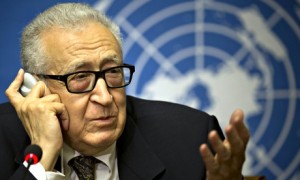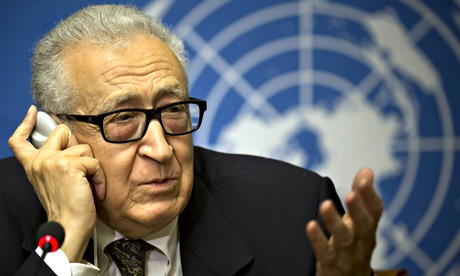Lakhdar Brahimi calls for co-operation as UN attempts to co-ordinate civilian evacuation during temporary ceasefire

Amid chaotic scenes in Homs where the United Nations is attempting to co-ordinate the evacuation of hundreds of civilians during an agreed temporary ceasefire, the UN official mediating between government and opposition delegations in Geneva, Lakhdar Brahimi, conceded that the peace talks had not made much progress.
Russian foreign minister, Sergei Lavrov, said on Tuesday that a draft UN resolution on aid access in Syria was “detached from reality” and urged the west to refrain from what he called one-sided accusations against Damascus.
Australia, Luxembourg and Jordan last week presented their draft resolution meant to increase aid to Syria to the five security council permanent members, including Russia. Moscow swiftly rebuked the proposal as a non-starter.
“Our Western partners in the security council … proposed that we co-operate in working out a resolution. The ideas they shared with us were absolutely one-sided and detached from reality,” the Interfax news agency quoted Lavrov as saying after talks with the Algerian foreign minister, Ramtane Lamamra.
A spokesman for the UN human rights office in Geneva, Rupert Colville, said Syria’s government had broken its obligations under international law, which requires states to ensure minimum food supplies, essential medicine and safe water.
Colville said: “Almost none of these obligations have been met in Old Homs and various other besieged areas in recent months.”
Asked if the UN human rights chief, Navi Pillay, thought it was time for a UN security council resolution to force the Syrian government to meet its obligations, he said: “We certainly wouldn’t object to actions by the security council.”
Following a joint meeting of the two sides on Tuesday, Brahimi told a press conference in Geneva: “The beginning of this week is as laborious as it was in the first week. We are not making much progress. Of course for it to really take off we need co-operation from both sides here and a lot of support from the outside.”
Brahimi, who will meet senior Russian and US officials in Geneva on Friday, said he planned to report to the UN secretary-general, Ban Ki-moon, and the security council within the next few weeks.
Meanwhile, in Homs, humanitarian agencies attempted to evacuate hundreds of vulnerable civilians from beseiged areas. During the attempted evacuation, Syrian authorities detained 336 men and are still questioning most of them without direct supervision by any neutral third party, the UN said.
The men, deemed to be of fighting age by the Syrian authorities, were among 1,151 who left the rebel-held Old City of Homs during an agreed ceasefire that was extended for a second three-day period on Monday. Only 41 have been released. The UN has voiced its concern for the rest, who are being questioned in a school.
A Unicef and UNHCR spokeswoman, Melissa Fleming, said: “Mostly what we’re asking about is we’re concerned in general about how they are faring. What’s their health situation? What are their concerns?
“We [want to] ask them questions about the humanitarian situation that they left behind, which is information that is critical to us in passing to the colleagues who are doing the distribution inside the city.”
Colville said any evacuee, including those who had laid down their arms, must be protected from acts prohibited under international law, including cruel treatment, torture and humiliating and degrading treatment.
He said: “We are also deeply concerned to learn that a number of boys and men and their families were seized by the authorities as they left the besieged area. It is essential that they do not come to any harm.”
The UN-brokered “humanitarian pause” between 6am and 6pm has enabled aid to get into the old quarter of Homs, which has been surrounded by President Bashar al-Assad’s forces for more than a year and a half.
The evacuees included five women in the late stages of pregnancy, including one who was in labour and gave birth in hospital shortly afterwards, said a World Health Organisation spokeswoman, Fadela Chaib. Many of the others had skin diseases, Chaib said. Those who emerged told aid workers of a daily ordeal of cold, hunger, filthy drinking water and bombardment,
A World Food Programme spokeswoman, Elisabeth Byrs, said people coming out were weak, with obvious signs of malnutrition. “A man said he survived for a week with one spoon of bulgur,” she said, adding that the small amount of bulgur available in the besieged area was infected in insects.
Byrs added: “They said that daily they survived on leaves, grass, olives, and sometimes some wheat flour appeared and they were mixing flour with water to make a kind of bread.”
The ceasefire deal originally stipulated that only women, children and men over 55 years of age would get safe passage. On Sunday, however, the governor of Homs announced a caveat – men aged between 15 and 55 would be questioned and put through a “judicial process” that could include an amnesty.
Opposition activists have expressed concern that some Homs evacuees, particularly men, could encounter dangers such as those faced by residents who fled the besieged rebel-held town of Mouadamiya, near the capital, Damascus, in October.
The Old Homs ceasefire has been the first tangible result of the Geneva II peace talks, in their second round this week. The UN says it does not know how many people remain besieged in Old Homs – just one of the many sieges that have trapped more than a quarter of a million Syrians. President Assad’s forces have often used sieges to choke rebel-held areas – a technique that rebels have also employed.
Assad’s government describes all of those fighting to oust him as terrorists and has pushed for efforts to combat “terrorism” to be the main focus of peace talks in Geneva.
Russia, a long-standing arms supplier to Damascus, has been Assad’s main international protector throughout the civil war. Moscow rejects western accusations that it is shielding the Syrian president and says the Syrian people, not foreign powers, should decide the future of Assad.
In Geneva on Tuesday, Lavrov said Russia – which has used its veto power in the security council to block three western-backed resolutions aimed to increase pressure on Syria’s government during the conflict – would be ready to consider a draft agreement only if it was “not about one-sided accusations aimed at the regime”. He also called upon the security council to agree a resolution condemning “terrorist activity” in Syria.
Posted by The Guardian World News



